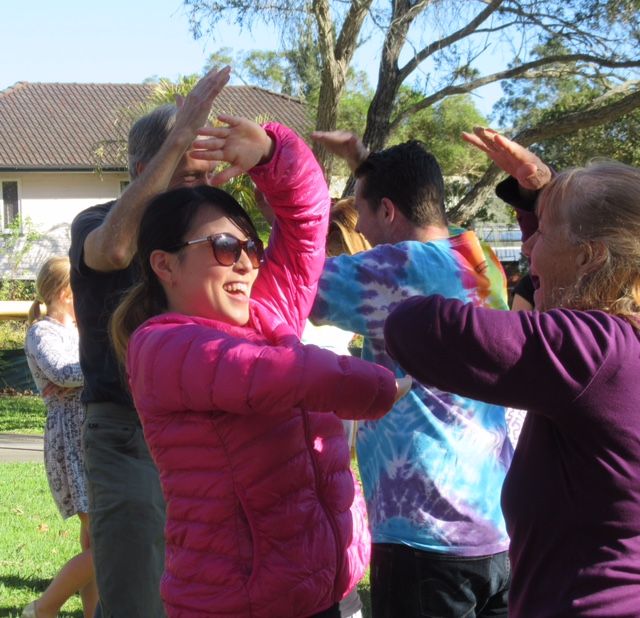
Ditching exercise because you don’t like it? Time to try laughter yoga!
Are you one of the many Australians a newly-released AusPlay survey has found is ditching exercise and not prioritising it in your daily schedule?
While COVID lockdowns saw many Australians turn to individualised exercise — like bushwalking and yoga — to support their mental health, the Australian Sports Commission’s research shows a growing cohort (11 per cent) of Australians are inactive and don’t see exercise as a priority.
That has health policy experts concerned — and me wondering whether now is the time for authorities to seriously consider laughter yoga’s physical and mental health benefits.
What is laughter yoga?
Laughter yoga is a light cardio process, originally developed by a physician and his yogi wife in India in the 1990s. Adaptable for all abilities and ages, it involves gentle stretches, playful movement, and belly laughter, along with diaphragmatic breath work.
Why experts are worried about Australia’s inactive
“If you’ve got really poor health and lot of chronic disease and [are] severely obese, it’s very hard to be active, especially through sporting activities,” Victoria University’s professor of sports participation Rochelle Eime told ABC News this week.
“That’s the issue. We’re getting rising obesity rates and rising chronic disease, which the health case costs, and the burden is massive.”
“We must continue to address the barriers that are stopping them from being active,” said federal sports minister Anika Wells in a media statement.
Why people don’t exercise
Common reasons people don’t exercise include:
- Don’t enjoy exercise. Let me counter that thought with who doesn’t enjoy laughing’
- Can’t afford it. Laughter yoga is offered as a low-cost/free social group activity, in-person and online across Australia
- Disheartened by lack of change. Even after the first session of laughter yoga, you feel ‘good’ and that’s motivating. SHIFT happens!
- Too stressed. Laughter yoga is an immediate stress buster
- Aches and pains, disability or injury stop you. Laughter yoga can be done seated or standing, indoors or outdoors, with movements adapted to abilities. Bonus, the release of endorphins during a session provides a natural painkiller.
Laughter yoga’s proven health benefits
Its name — laughter yoga or laughing yoga — sounds like ‘just a bit of fun’ yet medical research shows otherwise.
Take, for example, a Japanese study published this year of 43- to 79-year-old participants with metabolic syndrome* risk factors ( *Metabolic syndrome is a collection of disorders including high blood pressure, obesity, high cholesterol and insulin resistance that together increase the risk of stroke, heart disease and type 2 diabetes.)
A comprehensive 12-week laughter program, using laughter yoga, showed physical and mental health improvements including improved mean body weight and stress levels, and boosted optimism and quality of life indicators.
Then there’s the UK work of Anna Hatchard published last year in the European Journal of Applied Positive Psychology.
Her in-depth look at a small group of regular laughter yoga participants attending a monthly laughter club uncovered profound and lasting positive impacts. Most related to mental health: they learned techniques to destress and better cope with life’s ups and downs. But a greater awareness of overall health was also noted and with that came changes to reflect healthier living.
There’s a ton of further evidence-based research showing laughter yoga’s benefits.
If you’re involved in developing community health and wellbeing programs, don’t dismiss laughter yoga as ‘just a bit of fun’.
If you’re a healthcare provider who has run out of ideas for your inactive unhealthy patients, consider laughter yoga as a social prescription (for physical, mental and social wellbeing).
If you’re one of those 11 per cent not being active —maybe because you’ve not found an exercise that works for you and is fun—give laughter yoga a go. Find out where social laughter clubs are in Australia.
Laughter yoga could be the innovative inclusion that encourages inactive Aussies to move their bodies and begin a happydemic of better health and wellbeing.
(c) 2022 HeatherJoy Campbell
Former health journalist turned laughter wellbeing practitioner HeatherJoy Campbell is a professional laughter yoga teacher/trainer in Queensland who works with neighbourhood communities, aged care and workplaces.